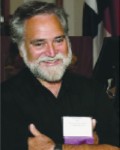ANCORA IMPARO
RICK RADER, MD ■ EDITOR-IN-CHIEF
Reflections on My History of Swearing
The third memorable event that found me "swearing" was orchestrated with my left hand on a Bible and my right hand raised in the air. It was on the recent occasion of being "sworn in" as a member of the National Council on Disability. I received both a Presidential nomination and appointment to this august body. It was both humbling and an honor.
Over the course of my 70plus years of living I probably have sweared (or is it sworn?) thousands of times. But it is noteworthy that there are three incidents that have been significant, memorable and life changing. First let me distinguish between "swearing" and "swearing".
To most of us "swearing" relates to rude or offensive language that someone uses, especially when they are angry. We know how frequently curse words, "four-letter" words, vulgarity, profanity and "cuss" words find their way into our daily communications.
Perhaps my earliest experience with swearing, or at least that which had a consequence was when I was about nine years old. I discovered that my dog Sparky has stained the carpet and it was my duty (no pun intended) to clean the mess. I declared to my mother that "Sparky shit again on the carpet." My mother was smart enough to wait until I cleaned the carpet to intervene. I can vividly recall her taking me into the bathroom and grabbing the Ivory soap bar on the sink and threatened to "wash my mouth out with soap," a popular antidote for having a "dirty" mouth. This apparently was a very popular "interactive" behavioral modification practiced in the 1940's and 1950's. It was evidence-based and, in my case, it worked. I never cursed again (at least not in close proximity to my mother's hearing range). Sparky was never able to be house-broken and I was told he was placed on a farm in upstate New York and was last seen happily chasing after chickens and cows – another popular behavior modification tactic from that era.
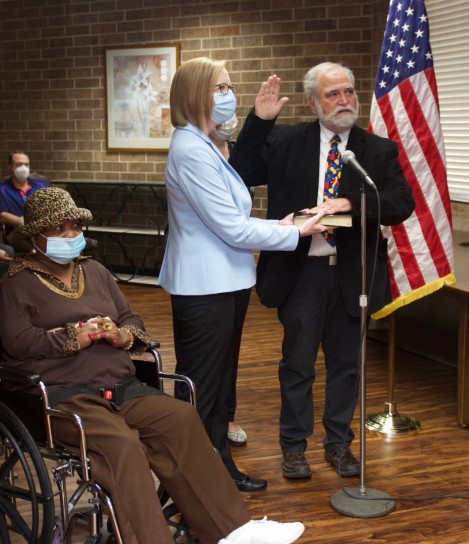
SWORN TO SERVE: Dr. Rader received a Presidential appointment to the National Council on Disability, which translates the needs and rights of people with disabilities into action that improves their lives.
In addition to my mother not approving of swearing, the Bible also had some harsh words on the subject.
In Proverbs 4:24 we find, "Put away you crooked speech, and put devious talk far from you." And Colossians 3:8, "But now you must put them all away: anger, wrath, malice, slander, and obscene talk from your mouth." There is, however, some insight into when the appropriate use of swearing might be supported. Ephesians 4:29 offers a pass, "Let no corrupting talk come out of your mouths, but only such as is good for building up, as fits the occasion, that it may give grace to those who hear." Looking back, I appreciate the fact that even if I knew that quote by heart, the Sparky incident was not the time to share it with my mother.
Shakespeare was fluent in the art of swearing. "Thou crusty batch of nature!" (Troilus and Cressida) is still effective; however small the number of people who would appreciate that they have been cursed at. If that doesn't work, there is always the Bard's lengthy, eloquent synonym for "idiot".
"Why, thou clay brained guts, thou knotty pated fool, thou whoreson obscene greasy tallow catch." Try that when someone takes the same parking spot you had envisioned for yourself.
Swearing has its share of health benefits. Alison Escalante, writing in Science, offers, "About a decade ago, the first evidence surfaced that swearing, or 'the use of taboo language conveying connotative information,' had pain-reducing effects. Past research has demonstrated that repeating a swear word helped people tolerate physical pain. It even helped decrease the social pain of being excluded." The title of her article sums it up best, "Swearing: The Fastest Acting Pain Reliever of Them All."
"Swearing" also relates to making a solemn promise, taking an oath or a vow. It's a pledge to commit to something that you have every intention to continue, maintain and adhere to.
While I can recall reciting both the Cub Scouts, and later Boy Scouts Pledge at the opening of every meeting, and reciting the Pledge of Allegiance (to the flag) every morning in school (from elementary school to high school), it was not until 1983 that reciting a pledge truly got my attention.
When I graduated medical school, I stood alongside my classmates and, in unison, we raised our right hands and announced, "I swear by Apollo Healer, by Asclepius, by Hygeia, by Panacea, and by all the gods and goddesses, making them my witnesses, that I will carry out, according to my ability and judgment, this oath and this indenture."
The Hippocratic Oath, written between the third and fifth century BC, is one of the oldest-binding documents in history. It is embraced by new physicians and it is a sacred oath that declares that they will treat the ill to the best of one's ability, that they will preserve a patient's privacy, and teach the secrets of medicine to the next generation. The third memorable event that found me "swearing" was orchestrated with my left hand on a Bible and my right hand raised in the air. It was on the recent occasion of being "sworn in" as a member of the National Council on Disability (NCD). I received both a Presidential nomination and appointment to this august body. It was both humbling and an honor. The National Council on Disability makes recommendations to the President and Congress on policies affecting Americans with disabilities. They empower individuals with disabilities, and promote equal opportunity. It is the most admired and respected agency that translates the needs and rights of people with disabilities into action that improves the lives of people with disabilities, their families and the communities they contribute to.
The "swearing" in ceremony was conducted by the Honorable Neil Romano, the Chairperson of the National Council on Disability. The significance of the appointment was elucidated by Lisa Grubb, the Executive Director of the National Council on Disability.
The event was made more significant by being held at The Orange Grove Center in Chattanooga, where for the past twenty-five years, I have had the pleasure, responsibility, and privilege of serving as the Director of the Habilitation Center. Orange Grove has provided the opportunity, support and encouragement for me to go out into the world and beg, borrow, and steal the most innovative and promising programs,
initiatives and ideas to benefit individuals with disabilities. I was thrilled to be surrounded by my wife, colleagues, friends, board members, and the folks we serve.
One thing is certain. Whether we have placed our hand on a Bible, raised our right hands, swore to Apollo or to the Constitution of the United States, those of us who wake up each morning in pursuit of ideas to make things better for our family, friends, communities and our inclusive society… we stand side by side, shoulder to shoulder… so help us God. •
A SOLEMN OATH: The swearing in ceremony was conducted by the Honorable Neil Romano, the Chairperson of the National Council on Disability. "I was thrilled to be surrounded by my wife, colleagues, friends, board members, and the folks we serve."
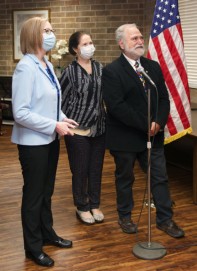
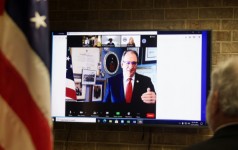
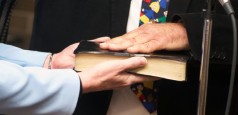
ANCORA IMPARO In his 87th year, the artist Michelangelo (1475 -1564) is believed to have said "Ancora imparo" (I am still learning). Hence, the name for my monthly observations and comments. – Rick Rader, MD, Editor-in-Chief, EP Magazine Director, Morton J. Kent Habilitation Center Orange Grove Center, Chattanooga, TN
